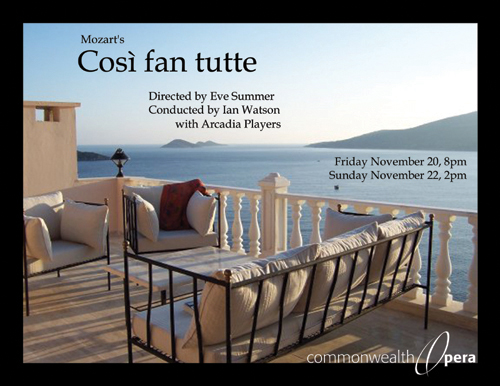I had the pleasure last night of participating in a production of Mozart's Così fan tutte staged by the Commonwealth Opera at the venerable Academy of Music in Northampton MA, where Richard Burton and Elizabeth Taylor used to go to movies while filming Who's Afraid of Virginia Wolff. The brains behind Commonwealth is the father-daughter team Joseph and Eve Summer; Joe is an opera composer, a talented impresario and, it turns out, a fellow Oberlin alum, and Eve is a free-lance stage director bringing her considerable skills in deft spoken-theater direction to the world of opera. I had a great seat in the pit, could see and hear everything (while the oboes weren't busy), and must say that this production was AMAZING--brilliantly staged, beautifully sung and acted, touching, intimate, and hilarious.
According to an online article, after Così Commonwealth will be putting on Lucia di Lammermoor in the spring, and is doing its entire season for a budget of under $200K; Joe told me that the total cost for two performances of Così was around 60K. How is this possible? Conventional wisdom is that a production of this quality would run a million or two at least at any big-city opera house, let alone the Met. Well, it turns out that Commonwealth runs on a shoestring: Joe and Eve are donating their services for the moment and the singers, while all excellent, aren't exactly household names. The orchestra, an expanded version of the local period-instrument group Arcadia Players stylishly conducted by Ian Watson, was working for summer-festival wages. There were a few glitches in the old theater--a wiring issue caused half the stand lights in the pit to quit working shortly before curtain, after trying to track down the problem while a local musicologist regaled the audience with verbal program notes we started 45 minutes late. The fact that there had been only three orchestra rehearsals meant that a few things weren't exactly together or in tune. But everyone was in a good mood, feeling part of something special, and the atmosphere was contagious. Nagging questions, such as whether spending more on the orchestra would have produced a tighter ensemble or whether a union electrician would have allowed the show to start on time, remained for the moment in the background.
I'm always interested in trends, and this enterprise seems to be part of one. There is a continuing interest in and appreciation for classical music, but the supply-demand balance between skilled and committed performers and paying audiences has gotten seriously out of whack: music schools continue to produce hundreds of talented graduates every year, and as we all know the recession has hit the arts as hard as anyone. So good musicians find themselves working for less than they used to, and perhaps a not-unwelcome byproduct of this (at least from the audience's point of view) is that access to great music and exciting performances is improving. In a small theater singers don't have to belt, and nuances of phrasing and gesture are more perceivable. Instead of paying a fortune to sit in a distant balcony at the Met, one may increasingly have the option of having a great seat at an intimate production such as this Cosi for less. Not such a bad thing, if we musicians can make a living somehow.
